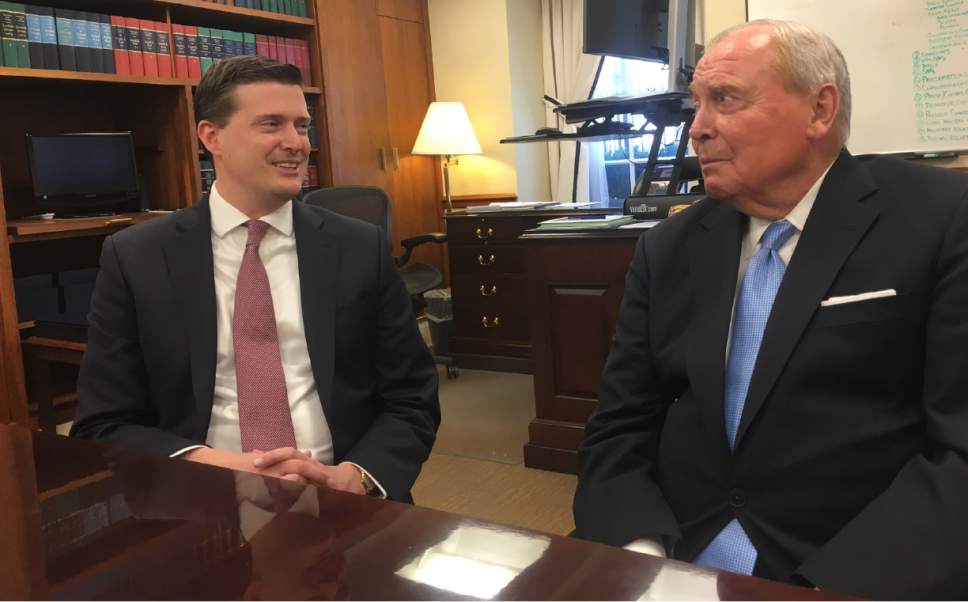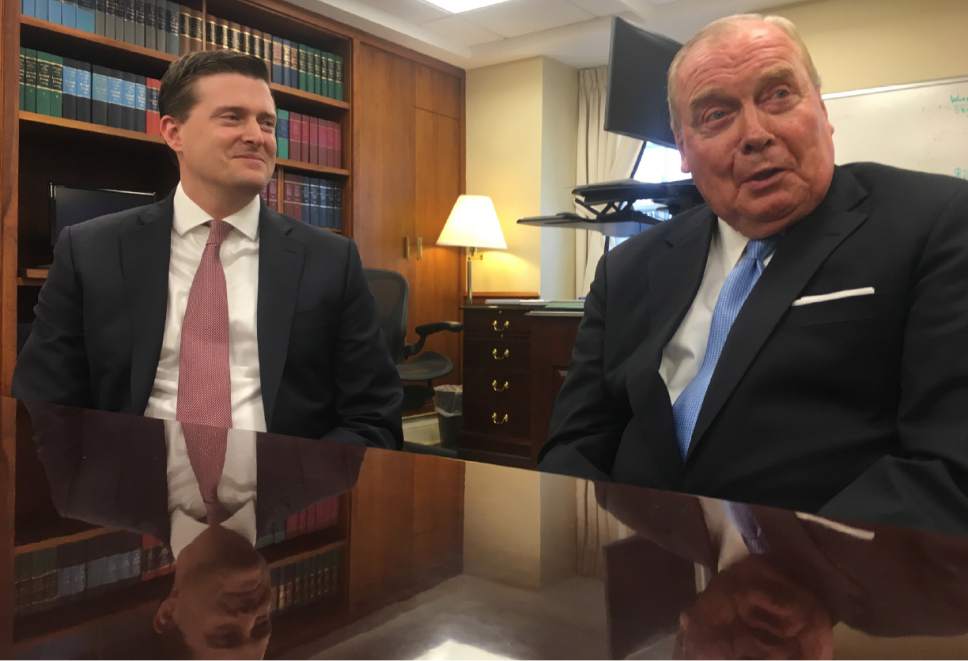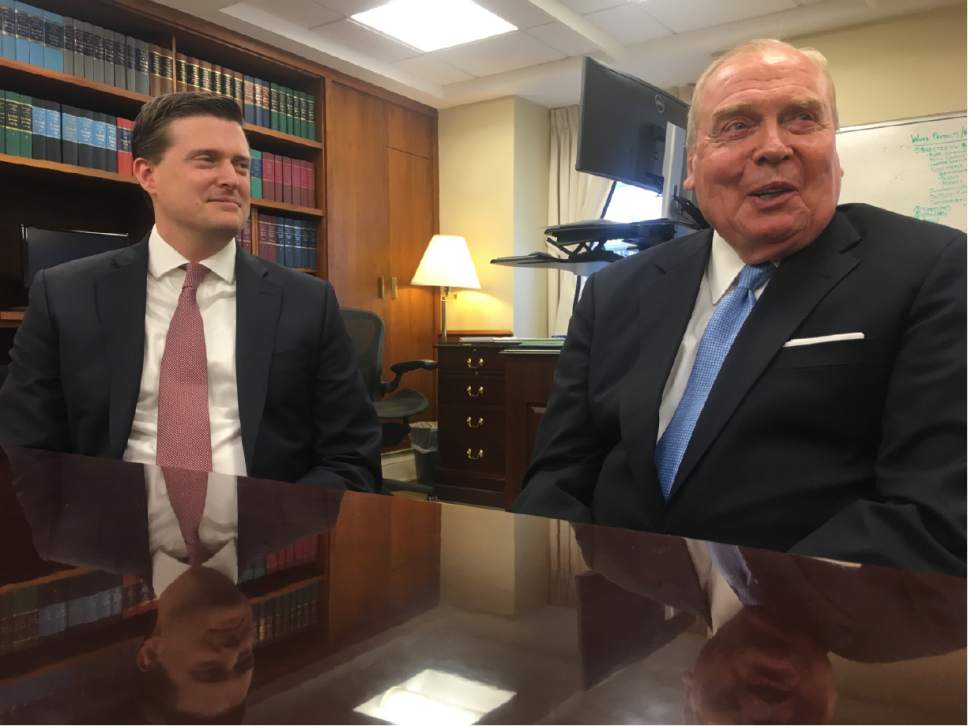This is an archived article that was published on sltrib.com in 2017, and information in the article may be outdated. It is provided only for personal research purposes and may not be reprinted.
Washington • There are plenty of challenging jobs in the White House but only a few as critical and tough as serving as staff secretary, who essentially acts as a filter of the flood of information that lands on the president's desk.
Under President Donald Trump, that role belongs to Rob Porter, a former top aide to Sens. Orrin Hatch and Mike Lee of Utah and who previously taught at Brigham Young University.
Porter, who also has the title of assistant to the president, joined the administration as the new commander in chief took office and now works from a spacious office — at least in West Wing terms — a short walk from the Oval Office. He interacts with the president multiple times a day, logs long hours at the White House and is at the center of all major actions emanating from the executive branch.
Wilton Persons, chief of staff to President Dwight D. Eisenhower, described the staff secretary as "the one office in the White House that knows the most about what is going on and where it is taking place." Porter is the one presenting the president with executive orders to sign in front of the cameras, who brings memos to his desk and the one who made sure formal copies of Trump's address to Congress was sitting on the House dais for him to hand to Speaker Paul Ryan and Vice President Mike Pence.
"The job of staff secretary, the principal task is to make sure the president is well prepared and his office is in order, to ensure that he is aware of all the correspondence and communications information and it really is a key nerve center of the White House," said Jon Huntsman Sr., who held the same role in the Nixon administration. "I'm so proud of Rob; he has the credentials to do a good job."
The staff secretary isn't a well-known role to most Americans. The TV series "The West Wing" included a character named Mrs. Landingham (later replaced by Deborah Fiderer) who was the fictional president's executive secretary and who was shown bringing papers to the president and deciding who enters the Oval Office.
The Hollywood version, not surprisingly, is different than actual life.
The staff secretary is one of the aides who works closely with the president, but includes a slew of other responsibilities, including overseeing the offices of the Executive Clerk, Records Management and Correspondence. The job entails sorting through which memos the president sees, organizing advice from top aides and seeking out answers to any questions the president raises.
The role has changed in the 47 years since Huntsman held the spot with some functions now delegated to others, but, for the most part, Porter is a key player in the new White House.
"The job still centers around the preparation of the president, the ingress and egress of all papers to be sure they should go before the president, the summary of everything that he reads and sees … everyone he meets and sees personally, that he has talking points," says Huntsman.
Making sure the White House is functioning takes a capable person in that role, he added.
—
Rising through the ranks • Porter was born in Boston, and he earned his undergraduate degree with honors from Harvard University and a graduate degree from Oxford University — where he was a Rhodes Scholar — and a law degree from Harvard Law School.
He worked as a private attorney and a visiting scholar in political science at BYU and as a law clerk on the U.S. Court of Appeals for the D.C. Circuit before heading to Capitol Hill where he worked as the top lawyer for Lee and Sen. Rob Portman, R-Ohio. Before joining the Trump White House, he was Hatch's chief of staff.
Porter said in an interview in his West Wing office that he's talked to many of his predecessors, from Republican and Democratic administrations, to learn the best advice for tackling the job. Every president's needs and wants are different, he noted, but he's excited to take on the job.
"I think like anything at the White House, the hours are long and it comes with its own challenges, but it's also a great honor and filled with a lot of learning and a lot of excitement," Porter said.
Huntsman, who met with Porter last week, said he worked 15-hour days under Nixon but the role changed in subsequent administrations to split up the workload.
Another former staff secretary, John Podesta, who served in the role under President Bill Clinton and later became his chief of staff, noted that Porter's job includes managing and coordinating all the paperwork and ensuring everything from top secret memos to policy-related materials reflect a wide range of views into potential actions.
"Rob is the air traffic controller of the White House, and in this White House, there are a lot of planes on the radar screen," Podesta, who was chairman of Hillary Clinton's campaign, said in an email. "President Trump is lucky to have someone with [Porter's] breadth and depth of experience."
Harriet Miers, who was staff secretary under President George W. Bush and later went on to serve as his general counsel and was a nominee for the Supreme Court, said the time commitment required for the job is "very challenging" and "very taxing."
"There is an aspect of the job where the staff secretary is really between advisers and the president, and that is beneficial to the president because there's someone assuring his advisers are being able to review materials before it comes to him," Miers said in an interview. "For example, you wouldn't want a president who gets something that sets out a policy position and then a day later have another adviser come in and say, 'I wouldn't do that.' … You're really preserving the president's time."
Although the staff secretary is in the middle of about every issue that comes before the president, it's not a role that's aimed at being partisan.
—
Avoiding conflict • The Trump team faced the hint of scandal from the outset. The U.S. intelligence assessment that the Russian government had tried to sway the election in Trump's favor was followed by the resignation of then-National Security Adviser Michael Flynn after 24 days. Layered on top of this are continued concerns about Trump's business ties around the world.
The White House turmoil is not likely to end soon as Congress and the FBI probe potential contacts between Trump and his aides and Russian officials.
But Huntsman, who left the Nixon White House before the Watergate scandal emerged and was never implicated in any wrongdoing, says the staff secretary isn't about partisanship.
"You really don't feel the politics of it as much you do the long, long hours of making sure the president is informed and all of the other offices within the government are notified and communicated with," Huntsman recalled. "It's about as far from the political side as you can go."
Part of that, Huntsman said, is being wise about making sure any requests come from the staff secretary and not from the president himself. Huntsman noted he issued 1,800 memos from his office that didn't include the name Nixon.
"We always said, 'It has been requested,' " Huntsman said. "And if it's the staff secretary, everyone knows that it's the president."
Porter is only a couple of months into the job but says he's learning quickly the best way to work with the president. While the job has changed a lot over time, he says the main focus is similar to when Huntsman and others occupied the office.
"There's a lot about the job and responsibilities that are the same and are consistent across administrations," Porter said, "but there's obviously a lot that adjusts and adapts to any particular president's preferences and personality and needs."
One thing that hasn't changed much through the decades?
"That couch over there, Rob, I know I had," Huntsman said.
Editor's note • Jon Huntsman Sr. is the father of Paul Huntsman, the publisher and owner of The Salt Lake Tribune.







